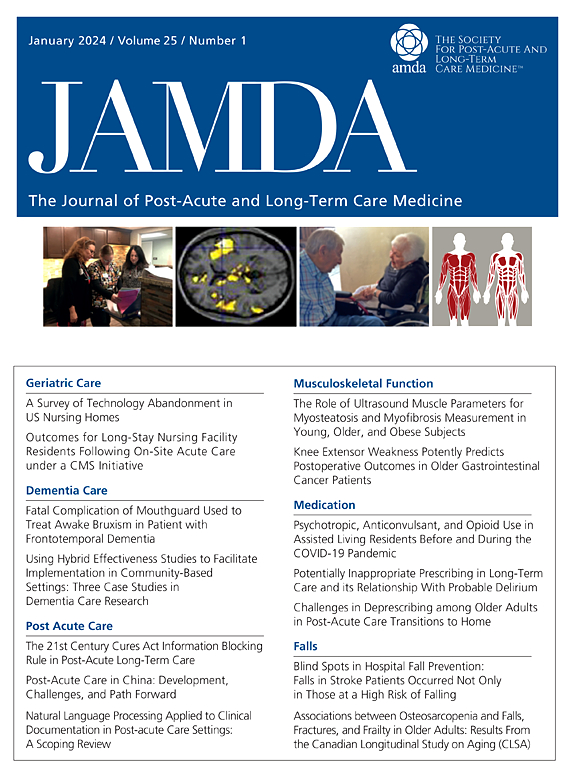Data Quality of Resident Documentation in Long-Term Care: A Systematic Review and Meta-analysis
IF 4.2
2区 医学
Q2 GERIATRICS & GERONTOLOGY
Journal of the American Medical Directors Association
Pub Date : 2025-03-13
DOI:10.1016/j.jamda.2025.105531
引用次数: 0
Abstract
Objectives
To evaluate the impact of interventions aimed at improving data quality in resident documentation in the residential long-term care setting, and to explore the experiences related with the implementation strategies and key determinants influencing data quality.
Design
A systematic review.
Setting and Participants
Residential long-term care.
Methods
PubMed and Embase were searched from inception to January 2025. This search was supplemented with screening study registries, references, prospective citation searching, and reviewing gray literature. Studies were selected and data were abstracted by 2 researchers. A narrative synthesis and random effects meta-analyses were performed. The GRADE level of evidence was determined. A thematic analysis was conducted for the qualitative data.
Results
A total of 30 studies were included. The introduction of electronic health records, educational strategies, incident reporting systems, and reminder strategies were associated with small to moderate improvements. The average effect across interventions was an improvement of 13% (95% CI, 7%–20%, I2 = 60%, very low GRADE) in data completeness. Overall data quality was improved in 3 studies, accuracy of data was improved in 1 study, and 1 study observed a nonsignificant improvement in reliability. Small effect sizes and very low-GRADE evidence were observed. Key determinants influencing data quality included the perceived usefulness of documentation systems, access to electronic health records, staff knowledge about clinical assessments, and perceptions of the appropriateness of quality indicators and data reliability. Implementation of interventions was supported by the following strategies: (1) identify and prepare champions, (2) audit and feedback on implementation, (3) provide ongoing consultation, and (4) disseminate implementation materials.
Conclusions and Implications
Small to moderate improvements in data quality were observed, with a very low GRADE of evidence. Most findings were limited to the completeness of documentation, although aspects such as timeliness and accuracy remain understudied. It remains unclear what interventions are effective in ensuring solid data quality.
长期照护住院医师档案资料品质:系统回顾与元分析。
目的:评估旨在提高住院长期护理机构住院记录数据质量的干预措施的影响,并探讨与实施策略和影响数据质量的关键决定因素相关的经验。设计:系统回顾。环境和参与者:住宿长期护理。方法:检索PubMed和Embase自建站至2025年1月。该检索还补充了筛选研究注册表、参考文献、前瞻性引文检索和回顾灰色文献。选取研究,并由2位研究者进行资料摘要。进行了叙事综合和随机效应荟萃分析。确定证据的GRADE等级。对定性数据进行专题分析。结果:共纳入30项研究。电子健康记录、教育策略、事件报告系统和提醒策略的引入与小到中等程度的改善有关。干预措施的平均效果在数据完整性方面改善了13% (95% CI, 7%-20%, I2 = 60%,非常低的GRADE)。3项研究的总体数据质量得到改善,1项研究的数据准确性得到改善,1项研究的可靠性没有显著改善。观察到较小的效应量和非常低等级的证据。影响数据质量的关键决定因素包括文件系统的可用性、电子健康记录的获取、工作人员对临床评估的了解以及对质量指标的适当性和数据可靠性的看法。干预措施的实施得到以下战略的支持:(1)确定和准备冠军,(2)审计和反馈实施情况,(3)提供持续的咨询,(4)传播实施材料。结论和意义:观察到数据质量有小到中等程度的改善,证据等级很低。大多数调查结果仅限于文件的完整性,尽管诸如及时性和准确性等方面仍未得到充分研究。目前尚不清楚哪些干预措施能有效地确保可靠的数据质量。
本文章由计算机程序翻译,如有差异,请以英文原文为准。
求助全文
约1分钟内获得全文
求助全文
来源期刊
CiteScore
11.10
自引率
6.60%
发文量
472
审稿时长
44 days
期刊介绍:
JAMDA, the official journal of AMDA - The Society for Post-Acute and Long-Term Care Medicine, is a leading peer-reviewed publication that offers practical information and research geared towards healthcare professionals in the post-acute and long-term care fields. It is also a valuable resource for policy-makers, organizational leaders, educators, and advocates.
The journal provides essential information for various healthcare professionals such as medical directors, attending physicians, nurses, consultant pharmacists, geriatric psychiatrists, nurse practitioners, physician assistants, physical and occupational therapists, social workers, and others involved in providing, overseeing, and promoting quality

 求助内容:
求助内容: 应助结果提醒方式:
应助结果提醒方式:


